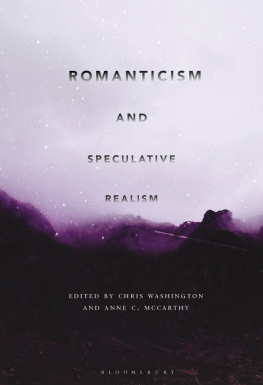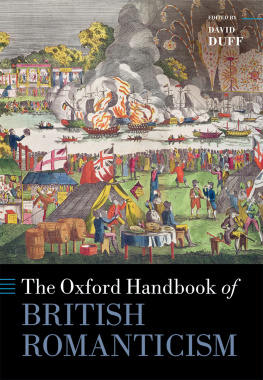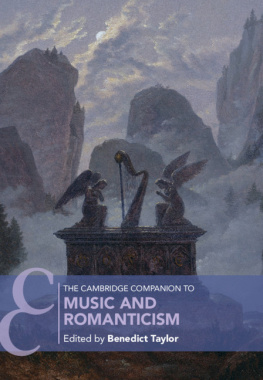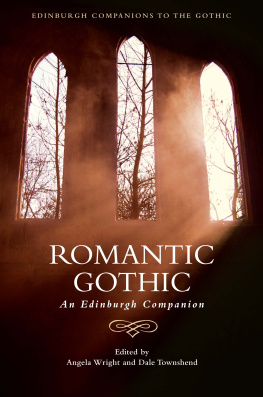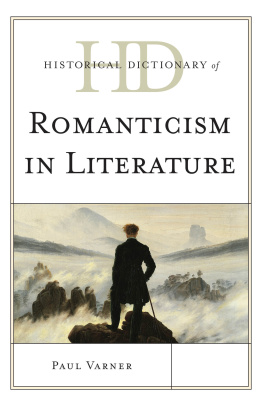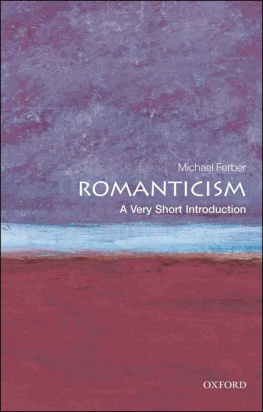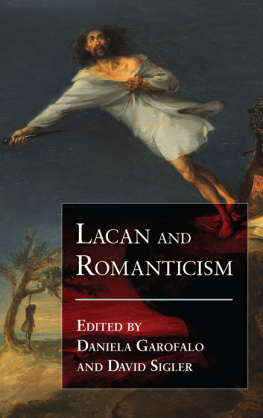Chris Washington and Anne C. McCarthy
The essays in this collection map the territory produced by the conjunction of the two terms in the title. Although this is not the first publication to identify important resonances between the literature and philosophy of the romantic era and the paradigms advanced under the banner of speculative realist philosophy, the and in our title signifies something at once more bold and more complex: the necessity of romanticism for understanding the world revealed by speculative realism; the horizons opened up for both romanticism and speculative realism when they are read with each other; and the possibility that perhaps they are only foils for one another, critiques that rebuff and curtail as much as they advance. If speculative realism provides a conceptual framework for reexamining anew the romantic ideology stereotyped as anti-realist and preoccupied by the human mind, then romanticism enables a radical rereading of speculative realism that reminds it of the aesthetic, the political, and the ethical dimensions that, in some accounts, it supposedly flees.
Romanticism and Speculative Realism thus aims to provide substantially new readings of romantic-era texts that can emerge only from an engagement with speculative realism when the singularity and multiplicity of both the romantic subject and object are taken into focus. The and of this volumes title, then, does not strictly conjoin the terms but rather lets them communicate their intimacies and extimacies as they discover them in an unremitting interchange, as Percy Bysshe Shelley might describe it. To put it another way, this is a collection that is speculative in the sense that it is determined to speculate about its own reasons for being and romantic in that it acknowledges that it is perhaps romantically destined to fall short of realizing any ambitions it harbors.
Romanticism has long been characterized as preoccupied with anthropocentricism, the human subject, and their ability to transcend the material world around them, whereas speculative realism is apparently at odds with such a preoccupation. Speculative realist thought took shape in the first decade of the twenty-first century, against the background of what three of its main thinkers, Leviism and speculative realism would seem to be diametrically opposed.
It is perhaps all the more strange that, in the opening pages of After Finitude: An Essay on the Necessity of Contingency (2006; English translation 2008), Quentin Meillassoux proposes that it is time for philosophy to go play outside in what is, essentially, a romantic terrain. [I]t could be, he argues,
that contemporary philosophers have lost the great outdoors, the absolute outside of pre-critical thinkers: that outside which was not relative to us, and which was given as indifferent to its own givenness to be what it is, existing in itself regardless of whether we are thinking of it or not; that outside which thought could explore with the legitimate feeling of being on foreign territoryof being entirely elsewhere.
For Meillassoux the great outdoors signifies the vast territory that Kantian and post-Kantian philosophy had largely excluded from its anthropocentric worldview. Since the human mind, according to Berkeley
Granted, not every speculative philosopher agrees on the specifics of how best to conceptualize this world without us, radically independent of mind. Certain thinkers, notably Ray Contrary to this view, the essays in this collection aver, in many different ways and from many different perspectives, that romantic-era authors have long tarried in the real.
For these reasons, the version of romanticism laid out in this collection is profoundly aware of the precarity of its own identity, ideology, and ontology. From the political shocks of the French Revolution and Napoleonic Wars to scientific discoveries that posed quandaries about human extinction
In a more immediate sense, this collection builds upon the insights and arguments laid out by Evan
Romanticisms awareness of the possibility of a broader subjective extinction extends beyond the human, to things and nonhumans that populate a world that is not necessarily for or even with us.
To see into the life of things, as William and essence.
As literary scholarsand, more specifically, as romanticist literary scholarswe are perhaps uniquely positioned to accept that the rift between appearance and essence, as Morton argues, obtains within the object itself, so that we should accept some kind of paraconsistent, possibly dialetheic logic that allows things to be what they seem, and not what they seem, simultaneously.
Recent critical work on Percy Bysshe Shelleys Mont
Indeed, the aporia Mont Blanc confrontsand what were thou, and stars, and sea, and earth / if to the humans minds imaginings / silence and solitude are vacancy? (ll. 1435)
Indeed, Roman
Somewhat against the mainstream of speculative philosophy and its stated impatience with the the now-tiresome Linguistic Turn, the essay in this collection maintains a commitment to the particularity and the exemplarity of the literary object as well as to the practices of close reading forged in the momentous crossing of romanticism and deconstruction ontology beyond their central concerns with finite subjects, the Kantian absolute, and the withdrawn object.
In this respect, this volume is not simply about rereading romanticism through speculative realism; it also concerns rereading speculative realism through romanticism. Rather than skew us toward a realism that excludes the supposed anti-realist literary object, romanticism (and deconstruction) and speculative realism, it turns out, remain committed to the literary objecteven as they expand what we mean by literary. Joined together, they also maintain the central importance of close reading to the speculative realist project and simultaneously champion the continued relevance of critical theory. And, for the most part, too, the contributors to this volume share a belief in the value of the aesthetica belief that is always already inseparable from beauty, as Keats declared in the Ode on a Grecian Urn. Beauty is truth, truth beauty (l. 49)the statement is as simple and as dizzyingly complex as it ever has been.
Take, for instance, de Mans striking comment in The Resistance to Theory:
It would be unfortunate, for example, to confuse the materiality of the signifier with the materiality of what it signifies. This may seem obvious enough on the level of light and sound, but it is less so with regard to the more general phenomenality of space, time or especially of the self; no one in his right mind will try to grow grapes by the luminosity of the word day, but it is very difficult not to conceive of the pattern of ones past and future existence as in accord with temporal and spatial schemes that belong to fictional narratives and not to the world.
The resistance to theory de Man diagnoses turns on the difference between the real and the linguistic, but affirms that confusing the two gives rise to ideological aberrations that forestall any understanding of the real. Most of us have long since absorbed the lesson that the connection between the signifier and the signified is conventional rather than phenomenological, a product of ideological practices. But de Mans hypothetical, resolutely realist vigneron nonetheless reminds us of how easily we fall back onto ideological and ontological fictions about our independence from the spatiotemporal reality of the world. The danger is not in the fictions themselves, that is, but in taking those fictionsde Mans temporal and spatial schemesas constitutive of realitys great outdoors.

